‘Swarm’: What If a Beyoncé Stan Became a Serial Killer?
- Oops!Something went wrong.Please try again later.
- Oops!Something went wrong.Please try again later.
- Oops!Something went wrong.Please try again later.
- Oops!Something went wrong.Please try again later.
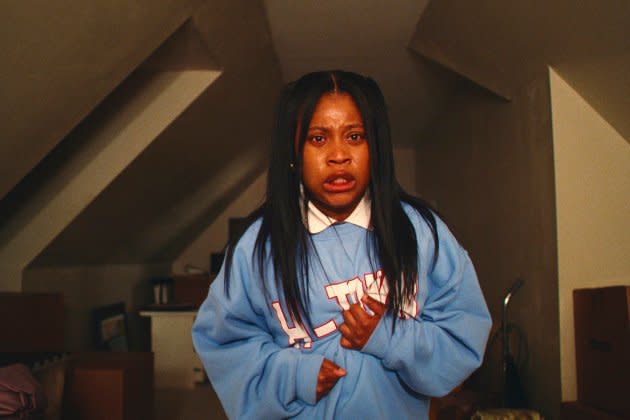
The cast and creatives behind Swarm, a mesmerizing TV series that premiered at SXSW ahead of its March 17 debut on Prime Video, have taken pains to avoid the elephant in the room: Beyoncé. It’s an odd predicament given that the form-breaking show is absolutely littered with references to the music icon. Ni’Jah is a pop star hailing from Houston, Texas. Her recent album is complemented by Afrofuturist visuals, and she has a talented younger sister who attacked her cheating spouse in an elevator. Dre (Dominique Fishback) is Ni’Jah’s most hardcore fan. A card-carrying member of the Swarm — the legion of militant Ni’Jah stans who drown out their enemies with bee emojis — Dre eats, sleeps, and breathes Ni’Jah. To her, Ni’Jah is a reminder of the before times, when she and her sister Marissa (Chlöe Bailey) were joined at the hip.
But that was then. Now, Marissa is about to move in with her fuckboy (Damson Idris), who shamelessly flirts with Dre any chance he gets. When tragedy strikes, Dre snaps, embarking on a wild interstate killing spree, always in search of the next victim (and Ni’Jah concert). Along the way, she encounters Paris Jackson, Kiersey Clemons, and an A-list musician who shall not be named.
More from Rolling Stone
Beyoncé Wants Jack White to Know How Much He Inspired 'Cowboy Carter'
Beyoncé's 'Cowboy Carter' Album Cover Invokes History, and Provocation
Swarm is co-created by Donald Glover and Janine Nabers, the latter serving as a writer and producer for Glover’s love letter to his hometown, Atlanta. This is, in some ways, that series’ evil twin, taking viewers to unexpected places along its perilous, ultraviolent journey.
Co-creator Janine Nabers and star Dominique Fishback — who delivers an extraordinary performance — sat down with Rolling Stone at SXSW to discuss their pot-stirring new show.
How did the idea for the show come to you, Janine? I understand you’re from Houston like a certain pop star.
Janine: I am from Houston. Donald pitched the idea directly to me. We knew that we wanted it centered in the world of a Black female perspective. Atlanta was a really personal story for him, being from Atlanta and wanting to show that side of Blackness and family and Atlanta, and with me being from Houston, we connected the dots to that. It was part of the narrative of him being online and seeing this Black woman tweet, “Why do Black women have to be the pillars in other people’s stories? Why do they have to be the smartest person in the room? We can be crazy, too. We can be serial killers.” And those two pitches from him fueled our imagination.
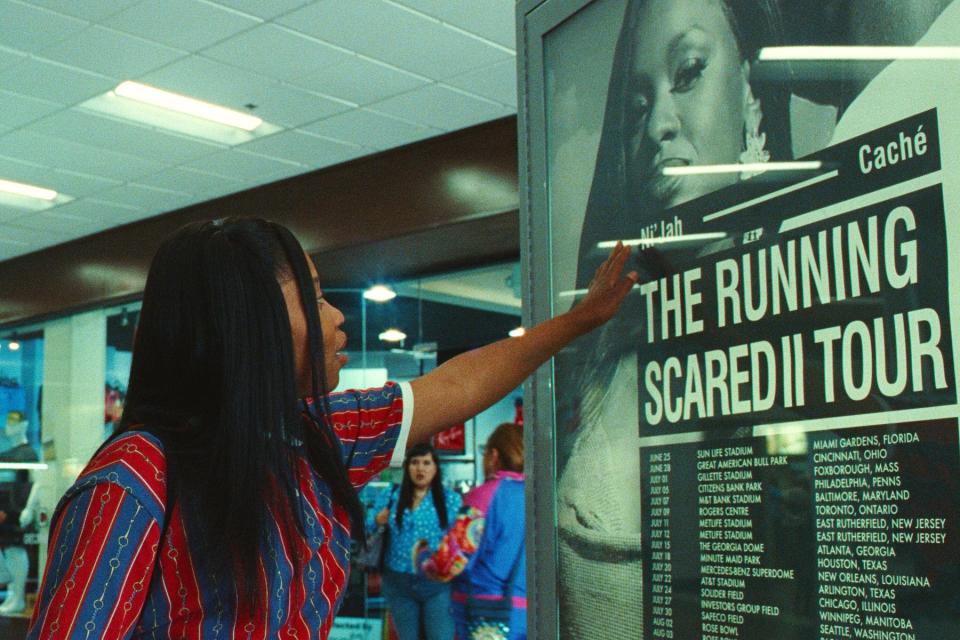
Dominique, I had read that Donald initially thought of you for Chlöe Bailey’s role of Marissa on the show.
Dominique: I got a message that Donald was working on the show that he wanted to be a part of it and to watch this movie, The Piano Teacher. And I was like, OK. I’d never seen anything like that, and I definitely hadn’t been asked to watch anything like that in preparation for a meeting. I watched it and got into the meeting with Janine and Carmen Cuba, who was casting it. I was excited to play Dre and sink my teeth into it, and they said, “We want you to play Marissa.” I read the script and really knew that I wanted to play Dre. I told my team and they said, “You might have to fight for it.” But I spoke to Donald on the phone and he said, “If that’s the role you want, that’s the role you get. Because it’s not about whether we think you can do it — we know you can do it — it’s just we think about Marissa, we think about somebody who’s popular, who’s familiar, and who feels relatable.” And those were the roles I’d done up until now — characters who were easy to like, accept, and love. That’s ultimately why I wanted to do Dre. I didn’t want to catch up to my own self or know what I was gonna to do next as an actor.
You didn’t even have to convince them.
Dominique: Honestly, that was the best thing. I was happy that I didn’t have to prove myself to them, and that I had done enough work for them to see, “Oh, this girl has the skills. She’s done enough work and we believe in her.” On top of that, they didn’t even say, “You have to do her like this.” I came to set and whatever I brought was what we went with. It was, “What does Dom bring?” and then we had that on top of their direction.
Janine: We were fangirling on Dom. You see her performance in Judas and the Black Messiah, and you go, “This woman is a movie star.” She’s a movie star. And some women who are stars like that don’t want to do a limited series. The fact that she was leaning into this bigger role, we were like, “This is Christmas. This is amazing.” It’s a very challenging story, it’s very outside the box, and it takes an actor with a tremendous sense of belief in themselves to really be fearless in it, and she was.”
Dre has a fascinating character arc. It’s a roller coaster ride and she’s so chameleon-like. From episode to episode, with each kill and each stop on her journey, she looks different and moves different. She transforms. You’re really playing many characters in one.
Dominique: I relished the opportunity. I come from theater and I have a one-woman show called Subverted, which is about the destruction of Black identity in America, so I was comfortable onstage doing multiple characters in one. I did not foresee a show like this where with this character, every episode would be a different part of herself. In my personal life, I’m toying with the idea that we all have masculine and feminine energies inside of us and life is about finding that balance, so to see it personified in this character, and this opportunity. is awesome. Dre goes through the whole spectrum of feminine and masculine energies. I didn’t map it out. I was more free flowing in terms of her development. She’s on a mission. She knows how to shape-shift in her own mind and think, “I have to be this to do this.” So, even in the second episode, is she actually doing it well as a stripper? No, she isn’t! She’s dancing all weird there, and they’re alienating her, but once she gets the information, she goes, OK, got it, and knows how to do it going forward.
I was going to ask you about that interpretive dance that you do in the strip club. It’s so representative of her, and how she operates on her own wavelength.
Dominique: That scene was supposed to be just the wrong vibe of song and she was supposed to be good at it, and then Janine went, “Actually, you look too sexy doing this. She looks like she knows what she’s doing.”
Janine: Dominique Dawson is an incredible costume designer, and Dominique is a gorgeous person, so when you put her in a certain outfit and put her onstage under the lights, we were like, “OK, this is the opposite of what we want right now.” There was this moment of being like, “Hey, you’re too charismatic and too beautiful. Let’s subvert this in some way so you see this evolution of her after several kills coming into her own in this beautiful, sexy way.”
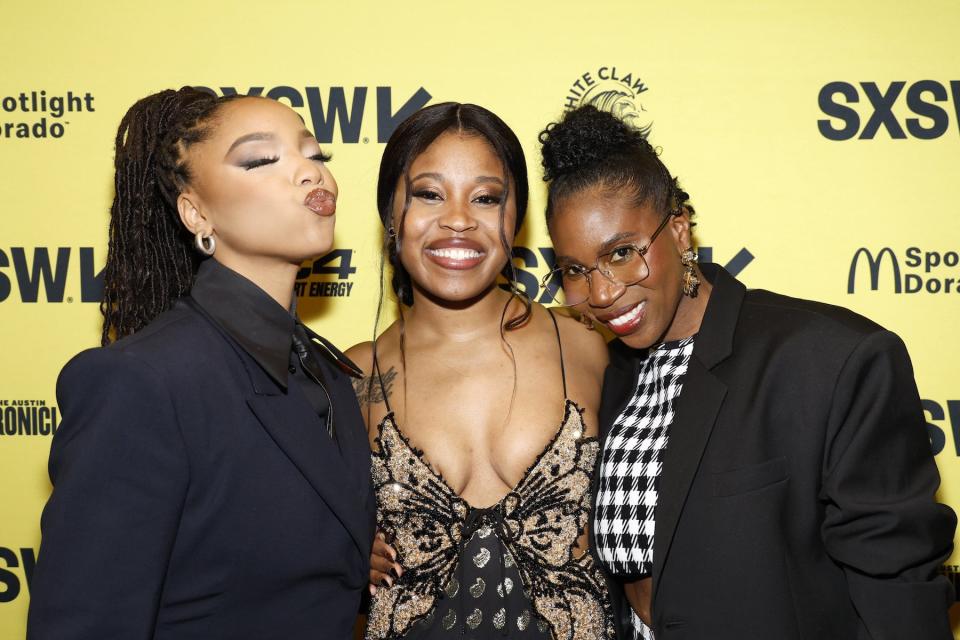
What do you think this show says about fandom? Obviously, that’s a big part of the show — how toxic fandom can get these days.
Janine: Well, at the end of the day, this is a story about Dre — a story about a woman who’s going through the grieving process, and who connects to two people in her world. When the pilot story happens, and she loses a sense of who she is, we see her go full steam ahead on Ni’Jah. That’s the story of the fandom we’re trying to crack in this series. It’s really a personal story of a Black woman who happens to feel alive through violence, and the idea that she falls through the cracks of her own life, and other people’s lives, and her own existence, and what does that mean.
Dominique: I feel like the fandom thing is a backdrop. It’s not at the forefront of the story. It is about Dre. These are the given circumstances — that she’s obsessed with this pop star — but through it there’s the love of her sister. There’s a thin line between love and hate, and she can’t tell the difference, and she hasn’t been given the tools to grieve properly. I read an article and didn’t know that the pilot was supposed to be a villain origin story, and I watched it yesterday through that lens and went, “Oh, shoot!” Because you see she’s victimized a lot and isn’t trying to cause pain to anyone. She’s trying to be left alone, but they keep going at her until she breaks.
There is a Beyoncé element to this, of course. How did you navigate that? Did you ask her for permission?
Janine: You know, Donald is a star himself. Donald is a huge celebrity. I’ve seen people try to take ownership of him. He has his own existence in the world as an artist. There are a lot of personal stories from him that are in this as well, and at the end of the day, it’s really about finding a feeling that you get. I happen to be from Houston, Texas. There are so many amazing women — Lizzo, Megan Thee Stallion — who came from Houston, in similar neighborhoods, and we’re all similar ages. Those women are in my DNA, so if I’m writing a story about music, and I’m writing a story about music with Donald, that is the story we’re going to tell. Donald has a relationship with the Paris Jackson’s of the world. All of that stuff is specific and plays on the meta-ness of the show on a lot of levels, but at the end of the day this is a story about Dre and her sister, and events that unfold in ways that are surprising and exhilarating and fun.
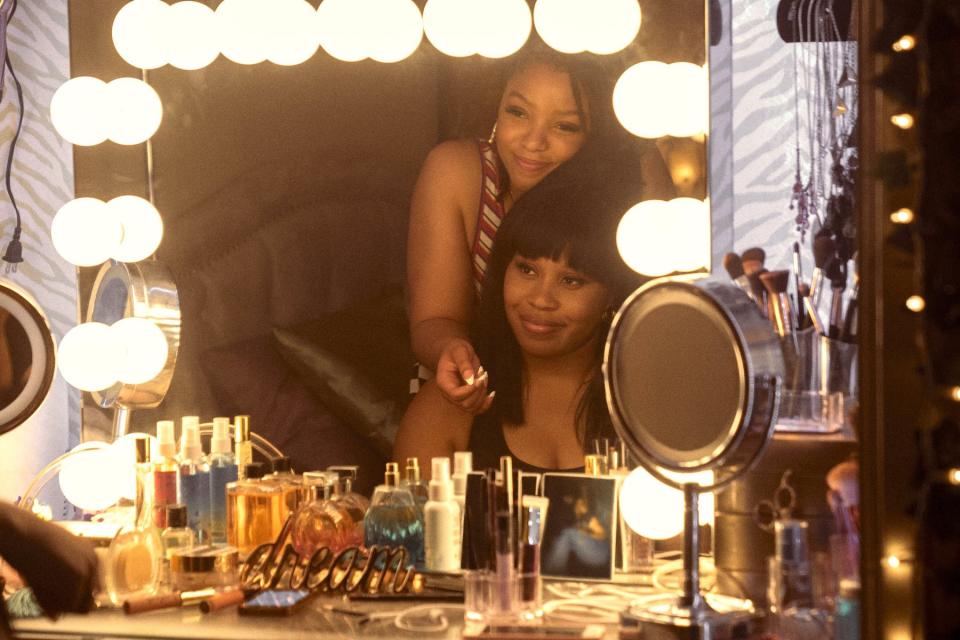
But what is it about that fandom in particular — the Beyhive, and the show is called Swarm — that made you want to use it as the context for this show? Because there are a lot of different fandoms out there, from the BTS Army to the Rihanna Navy.
Janine: I just think when you think of stans, as a Black woman, what do you think of? If I were Korean, maybe it would be BTS. But we’re approaching this story from a real feeling of identity and being seen, and the narrative that that gives us — the lens to tell the story.
Dominique: For me, I actually didn’t study any fandom. I knew that the universal feeling is love. That’s what we all know. Dre loves her sister and she loves this person. I didn’t need to study any fandoms or go down any rabbit holes. I just needed to be present. That’s how I know that the show is more about a feeling than about a particular person, because I didn’t have to study a particular person — or fans of a person — to understand what this girl felt.
Janine: When I was talking to Donald about the show, we talked a lot about Elephant and Last Days. Last Days has an echo of Kurt Cobain, but it’s really about the feeling that he gave to white poor people at that time in Seattle, and queer people. And Elephant being the feeling of these small-town, white, suburban emo weirdos and the rage in cis white men before we even knew what that terminology was. Just taking their rage out on a school, but not naming any of the events and the real people behind it. It’s really about the feeling, and that’s what this show is. Those movies and The Piano Teacher are the blueprints for this show. Most of the people that have seen all the movies that we’ve named are white people. I don’t know many Black people that know these movies exist. This is finding a way to highlight movies that have inspired us as Black creatives in a Black space, and turning the lens of whiteness onto Black people, and the feeling that someone gives them.
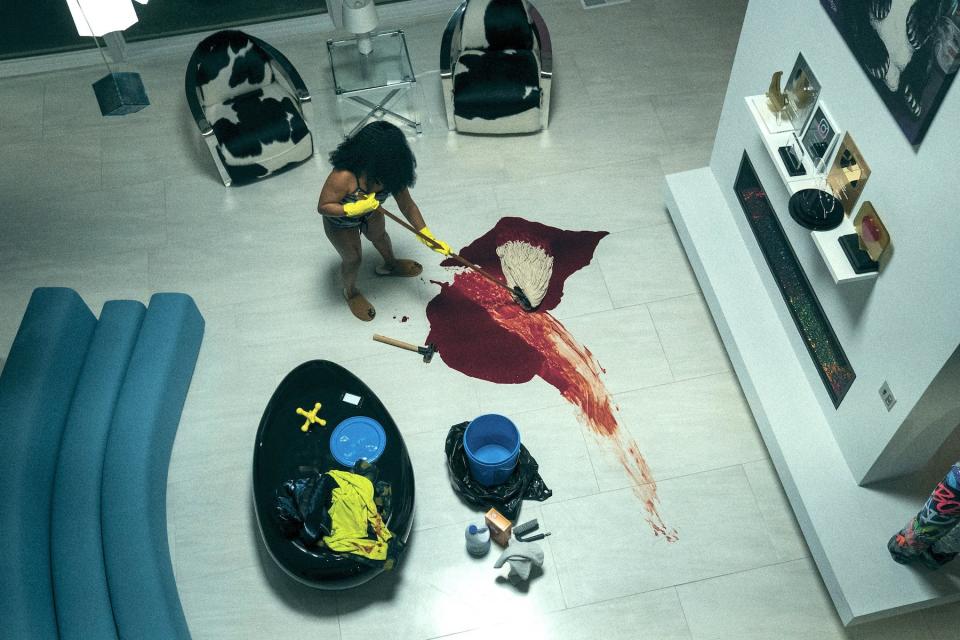
I wanted to go back to that original tweet you mentioned — that Black women can be everything and should have the freedom to play serial killers. Because this show does seem to be about the freedom of expression, and the ability to let it run wild.
Janine: I wrote on the last two seasons of Atlanta, and I would say that at the end of the day, Atlanta was that for me. As a person who was Black, I’d never been in an all-Black writer’s room until I’d been on Atlanta. That show broke the mold for me not only in terms of Black identity, and family, and music, but it broke the form. When we set out to do Swarm, we wanted to break that mold again. And it’s challenging when you’re breaking form. People approach TV in a very specific way. Everything has a formula. The formula of Atlanta is that there is no formula. Being someone who’s written on TV for eight years with very formulaic stuff, to come into this as the leader of the storytelling, and the leader of the production, and the leader of assembling all these actors and saying, “Normally, you would have a script right now, but this and this is happening,” there’s a little bit of dysfunction when you tell a story without formula on TV. You’re taking people who have studied TV for years and you’re saying, OK, I’m going to take a hammer to your head, crack it open, and blow your mind a little bit. I know you’re used to things going this way, but we’re actually going to do this episode first. And this episode isn’t really done yet, but we’re going to insert this part into it. It’s an experimental art piece. And that’s what Atlanta was for people. People didn’t know what Atlanta was initially either. They were like, what is this? It’s like Twin Peaks for rappers, what does that mean? How are you going to tell the story?
Dominique: Well, it’s funny that you chose the word “freedom,” because that was really important to me. In my personal life, I give every year a word, and 2020 was my “freedom,” or Free Dom, year. We got quarantined and I learned that freedom was in the mind, and freedom comes at a high cost, because you have to let go of the things you cling to in order to get something beyond it. That was what Dre is for me. I get freedom at Dre’s expense. As an artist, you say, “I want freedom!” and then the opportunity presents itself, and you get scared. I had to step up to what I’ve been searching for as a person, and as an actor. I had to decide that I really wanted freedom, and freedom meant doing something that I’ve never done, and some people are gonna love it and some people aren’t. There’s gonna be so much conversation.
Best of Rolling Stone

